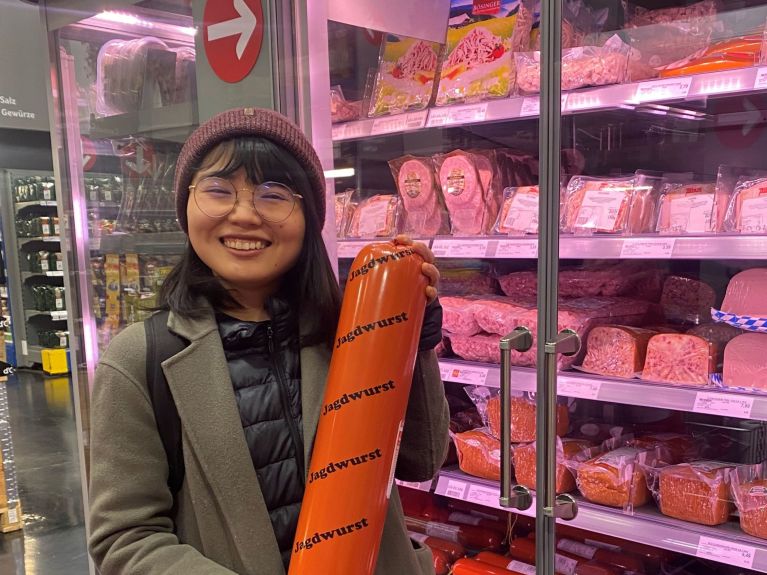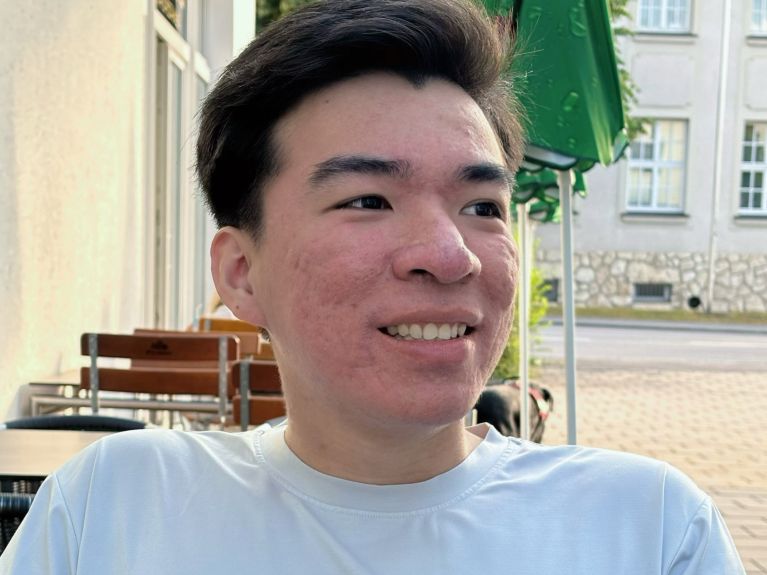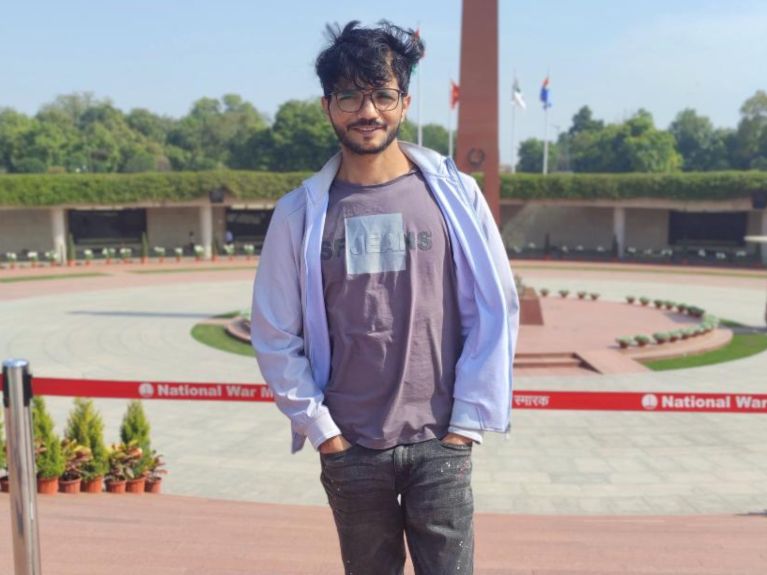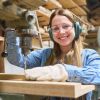Dual vocational training in Germany: “I’m living my dream”
Aching muscles, learning German and a spirit of adventure: three young people from Asia talk about their experiences as apprentices in Germany.

Kana Horisawa, aged 32, from Japan, training to become a butcher in Leipzig
If I had to describe myself in three words, I’d say: creative, adventurous, sausage lover. That might sound odd, but I’ve loved sausages for as long as I can remember. My home country Japan may be known for excellent sushi – but really good sausages are something you’re more likely to find in Germany. That’s why I’d long dreamed of travelling to Germany one day. But first, I spent over eight years working in a copy shop in Miyagi. I wasn’t happy. Spending so much time in front of a screen wore me out – I missed working with my hands. During the pandemic, I bought a second-hand sausage machine and started watching YouTube videos on how to make sausages. My first attempts were still quite bland, but I improved quickly. Even so, I never imagined that this new hobby would one day become my profession.
When I travelled to Germany in 2023, I was just planning a short holiday. But in Leipzig I became part of a Japanese community and felt so at home that I wanted to stay. Many of my new friends had done vocational training here – so I visited a few butcher shops in person and asked if they were looking for apprentices. My current boss was very surprised at first, but he still invited me to do a trial shift. It went so well that I quit my job in Japan and was able to officially start my apprenticeship as a butcher in Leipzig in summer 2024. Every day I get up at three in the morning, then spend hours cutting, chopping and seasoning meat. The larger pieces often weigh 15 kilos or more. In the early days I often had sore muscles after work. In the evenings I still spend several hours learning German.
I know I have a real future here as a butcher!
The training pushes me to my physical and mental limits – but I’m living my dream. What I enjoy most is still developing new sausage varieties in my own kitchen. I love experimenting with Japanese ingredients like miso, seaweed and shiso leaves. It’s a true German–Japanese sausage fusion! As part of my training I’m also learning how to properly cut, prepare and sell meat. My work is so varied! That makes it all the more surprising to me how few young people in Germany want to go into butchery. Every year, thousands of apprenticeship positions remain unfilled. And yet the Germans do love their sausages! So I know I’m in demand on the job market – and that I have a real future here as a butcher!”

Ho Nhut Khanh, aged 22, from Vietnam, qualified metal technician specialising in cutting technology in Beilngries
“Applying for the PAM programme was definitely one of the best decisions of my life. The project gives young people in my home country, Vietnam, the opportunity to complete a training course in cutting technology based on the German model and then come to Germany as a qualified skilled worker. Cutting machine operators manufacture precision components from metal or plastic by turning, milling, drilling or grinding. I came across the programme by chance on my school’s website in Vietnam and was immediately excited: on the one hand, I was drawn to the adventure of living in a foreign country while at the same time I was impressed by Germany’s fair working conditions and good wages. I was also persuaded by the fact that the programme is completely free – even the flight costs are covered.
So I applied with high hopes – and I wasn’t disappointed. My training as a cutting machine operator in Vietnam was itself a resounding success. While the Vietnamese training model focuses mainly on theory, the German-style training was all about hands-on practical work from the start. I learnt how to process metal, calibrate milling and grinding machines, and produce components for engines and machinery. I particularly enjoy the technical side and the precision involved.
PAM: partnerships for fair migration
The German development agency GIZ runs the PAM project to promote fair and regular training and labour migration that benefits everyone: Germany, its partner countries, and the trainees and skilled workers themselves. PAM stands for “Partnerships for development-oriented training and labour migration”. The project is active in Vietnam, Jordan and Ecuador. It was commissioned by the Federal Ministry for Economic Cooperation and Development (BMZ) and launched in 2014.
Beware of dubious offers
Unfortunately, there are a lot of questionable offers out there on social media from agencies claiming to place international professionals. They often involve hidden costs and make unrealistic promises. “Make it in Germany” provides guidance to help you spot trustworthy providers.
As part of the PAM programme, I also took a course alongside my German lessons to prepare us for life in Germany. That’s where I learnt how to sort waste properly, for instance. Looking back, I’m really grateful for that preparation – without it, I’m sure I’d have made a few cultural blunders. So when I arrived in Beilngries, Bavaria, in April 2024, I felt at home right away. I now work as a qualified employee at a mechanical engineering company in the automotive and aerospace industry. The working atmosphere is great, and my colleagues are always happy to help if I don’t understand something. And outside of work, too, I’ve really settled into life in Germany.
What I appreciate most is how safe and peaceful it is here. After work, I often go hiking on the Hirschberg, just around the corner from me – this Alpine landscape is completely different from Vietnam, and the view from the summit is simply breathtaking. When I’m not hiking, I play badminton at a local club. That’s also where I met my new Bavarian friends. I’ve even picked up a bit of their dialect! In short: life in Germany is great! The only thing is, I really miss my mother and sister – I hope they’ll be able to join me here one day.”

Wasim Chowdhary, aged 29, from India, training to become a road builder
“My greatest passion is building. I’ve always been fascinated by how – with the right materials and techniques – entire roads and buildings can be created out of nothing. That’s why I always knew I wanted to become a civil engineer. I finished school near Kashmir in northern India, studied there and later found a good job. I liked the work itself – but still, I started to have doubts. Some days I’d spend 18 hours on the construction site or in the office, often working weekends too. There were hardly any paid sick days or holidays. I barely had any time left for my family or hobbies – and I felt like I wanted more out of life.
I did some research and came across an Indian recruitment agency that offers the opportunity to learn a skilled trade in Germany, in cooperation with the Chamber of Crafts in Ulm. It sounded intriguing! I’d already heard a lot of good things about Germany’s dual vocational training system and the quality of the construction industry. So I applied for an apprenticeship as a road builder, started learning German straight afterwards – and began my training in October 2024 in Tettnang, near Lake Constance. The Chamber of Crafts helped me find an apartment and answered all my questions, so I felt at home from day one.
I love the peace and quiet in Germany!
India is always noisy and crowded – Germany feels calm by comparison. I really love this peaceful atmosphere. I also really enjoy German festivals – at Christmas and during carnival in particular there’s a very special atmosphere! I really appreciate having regular working hours and plenty of free time – although sometimes I’d actually even like to work more, just to keep learning! Even with a degree in engineering, I don’t feel underchallenged on my vocational training course. I find the maths and theory lessons easy, but the practical side is very different from what I did in India. I’m learning to build from the ground up again – and developing a much deeper understanding of my trade. I want to give my all on this training course – and one day I want to earn my master craftsman qualification. Where? Here in Germany of course!”



